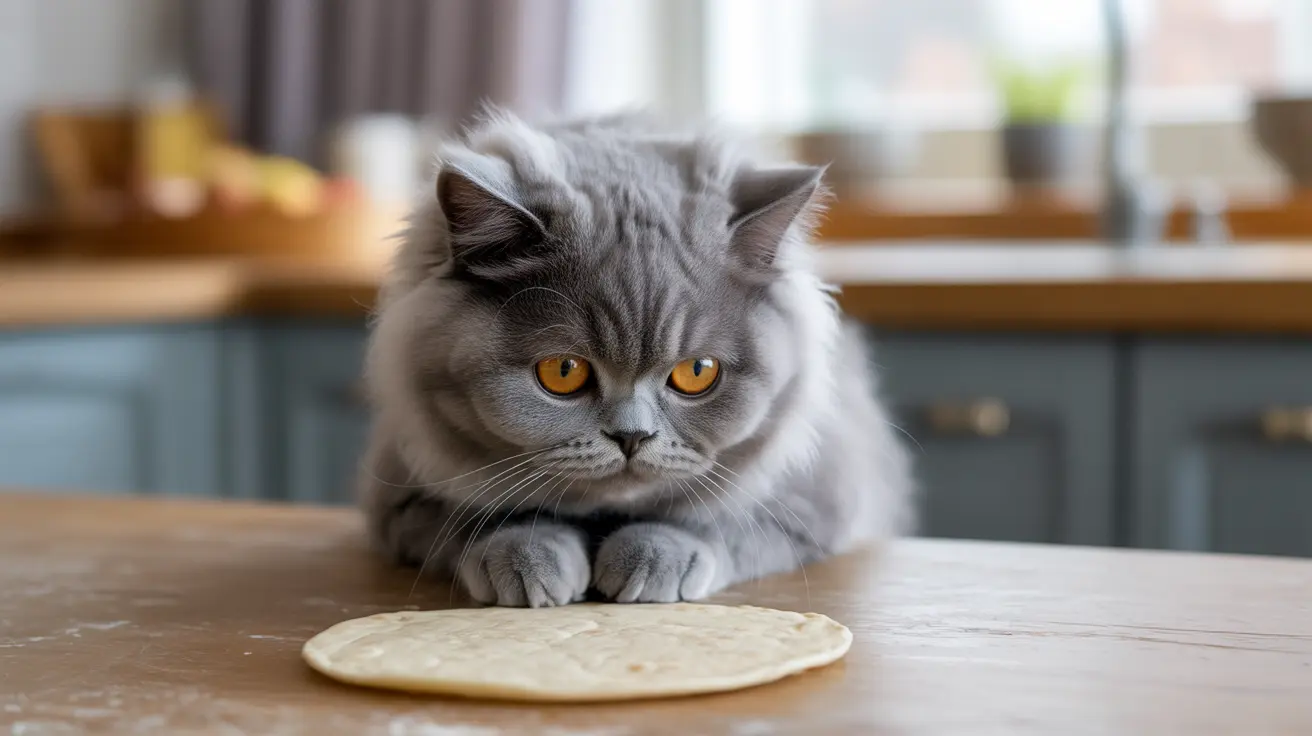As a cat owner, you may have wondered whether sharing your tortilla with your feline friend is safe. While cats can technically eat tortillas without immediate danger, there are important considerations and potential risks to understand before offering this human food to your pet.
In this comprehensive guide, we'll explore the safety of feeding tortillas to cats, potential health risks, and better alternatives for treats that support your cat's nutritional needs.
Understanding Cats' Nutritional Needs
Cats are obligate carnivores, meaning their bodies are designed to process and utilize nutrients primarily from animal-based proteins. Their digestive systems aren't equipped to handle large amounts of carbohydrates and plant-based foods like tortillas.
Unlike humans, cats lack specific enzymes in their saliva that help break down starches, making it more challenging for them to digest foods like tortillas effectively.
The Truth About Tortillas and Cats
While a small piece of plain tortilla won't typically cause immediate harm to your cat, these wheat or corn-based flatbreads offer virtually no nutritional benefits for felines. In fact, tortillas contain several components that could be problematic for your cat's health:
Carbohydrate Content
Tortillas are primarily composed of carbohydrates, which cats don't need in large quantities. Their natural diet should consist mainly of protein and healthy fats.
Sodium Levels
Most tortillas contain significant amounts of salt. A single tortilla can have up to 400mg of sodium, while cats should only consume about 42mg of sodium daily. Excess sodium can lead to serious health issues in cats.
Potential Health Risks
Short-term Effects
Feeding tortillas to your cat might result in immediate digestive issues including:
- Vomiting
- Diarrhea
- Stomach discomfort
- Lethargy
Long-term Concerns
Regular consumption of tortillas can lead to more serious health problems:
- Weight gain and obesity
- Diabetes
- Digestive system problems
- Nutrient deficiencies
Safe Feeding Guidelines
If you decide to give your cat a tiny piece of tortilla as an occasional treat, follow these important guidelines:
- Only offer plain, unseasoned tortillas
- Keep portions extremely small (smaller than a fingernail)
- Monitor your cat for any adverse reactions
- Limit treats to no more than 10% of daily caloric intake
Healthier Alternatives to Tortillas
Instead of tortillas, consider these nutritious treat options for your cat:
- Small pieces of cooked, plain chicken
- Tiny bits of cooked fish (without bones)
- Commercial cat treats formulated for feline nutrition
- Small amounts of cooked egg
Frequently Asked Questions
Can cats safely eat tortillas as a regular snack?
No, tortillas should not be given as a regular snack. They lack essential nutrients cats need and contain unnecessary carbohydrates and sodium that could be harmful when consumed regularly.
What are the health risks for cats if they consume high amounts of tortillas?
High tortilla consumption can lead to obesity, digestive issues, diabetes, and sodium-related problems. Cats may also experience immediate symptoms like vomiting or diarrhea.
How can I safely give my cat tortillas without causing digestive issues?
If you must give your cat tortilla, offer only a tiny piece of plain, unseasoned tortilla occasionally. Monitor your cat for any adverse reactions and discontinue if problems occur.
Are corn tortillas healthier than flour tortillas for cats?
While corn tortillas may be slightly more digestible, neither type is particularly healthy for cats. Both varieties lack essential nutrients and contain unnecessary carbohydrates.
What are some safer snack alternatives to tortillas for my cat?
Better alternatives include small pieces of cooked plain meat, commercial cat treats, bits of cooked fish, or small amounts of cooked egg. Always ensure treats make up no more than 10% of your cat's daily diet.
Conclusion
While cats can technically eat small amounts of tortillas without immediate danger, it's best to avoid making them a regular part of your pet's diet. Focus instead on providing your cat with nutritionally appropriate foods and treats that support their carnivorous dietary needs.
Remember, when in doubt about any food items, always consult with your veterinarian, especially if your cat has existing health conditions or dietary restrictions.






